In this post, I will explain what NAD is, its functions, and why it is super important if you want to live long. In a week from now, I will share my own NAD levels.
What is NAD?
NAD (Nicotinamide adenine dinucleotide) is a vital coenzyme found in all living cells. It plays a critical role in numerous biological processes, particularly in cellular energy production and metabolism.
What are the functions of NAD?
Energy Production:
NAD is central to cellular respiration, where it helps convert nutrients into energy.
It acts as an electron carrier in redox reactions, alternating between oxidized (NAD) and reduced (NADH) forms.
In glycolysis, the Krebs cycle, and oxidative phosphorylation, NAD collects electrons and transfers them to the electron transport chain to generate ATP.
DNA Repair:
NAD is a substrate for enzymes like PARPs (poly-ADP-ribose polymerases), which are involved in repairing damaged DNA.
Cellular Signaling:
NAD is a precursor for signaling molecules such as cyclic ADP-ribose, which regulates calcium levels in cells.
Sirtuin Activation:
NAD is required for the activity of sirtuins, a family of enzymes that regulate aging, inflammation, and metabolic health by modifying proteins.
Gene Expression:
By influencing sirtuins and other pathways, NAD affects the expression of genes involved in metabolism and stress responses.
Why is NAD important for longevity?
Energy Metabolism
NAD is essential for converting food into energy. It acts as a coenzyme in key metabolic pathways like glycolysis, the Krebs cycle, and oxidative phosphorylation.
Declining NAD levels with age impair mitochondrial function, leading to reduced energy production and cellular aging.
DNA Repair
NAD is a critical substrate for enzymes like PARPs (poly-ADP ribose polymerases), which repair DNA damage.
Accumulated DNA damage is a hallmark of aging, and sufficient NAD levels support efficient DNA repair mechanisms.
Epigenetic Regulation
NAD is required for sirtuins, a family of enzymes that regulate gene expression and promote stress resistance, mitochondrial function, and metabolic health.
Sirtuins depend on NAD to remove acetyl groups from proteins, affecting processes linked to longevity.
Reducing Oxidative Stress
NADH (the reduced form of NAD) donates electrons to the electron transport chain, minimizing the production of harmful reactive oxygen species (ROS).
Proper NAD balance helps protect cells from oxidative damage, a major contributor to aging.
Autophagy and Cellular Health
NAD supports processes like autophagy, the removal of damaged organelles and proteins.
Efficient autophagy promotes cellular rejuvenation and prevents the accumulation of toxic materials linked to age-related diseases.
Inflammation Control
Declining NAD levels contribute to inflammaging, the chronic low-grade inflammation associated with aging.
NAD influences the immune system and prevents overactivation that can harm tissues.
Maintenance of Circadian Rhythms
NAD regulates circadian rhythms by interacting with clock genes.
Proper circadian regulation supports cellular repair, metabolism, and hormonal balance, all of which impact longevity.
Neuroprotection
NAD supports neuronal health by promoting energy production and repairing damaged neurons.
Low NAD levels are linked to neurodegenerative diseases like Alzheimer’s and Parkinson’s.
Why does NAD decrease with age?
This happens because we use more NAD to fix age-related damage, produce less of it, and recycle it less efficiently. Factors like stress, poor diet, and inflammation speed up the decline. Enzymes that break down NAD become more active with age, and damaged cells use up extra NAD.
How can we increase NAD naturally?
Increasing NAD levels naturally can be achieved through lifestyle choices and dietary adjustments.
Exercise Regularly
Engaging in moderate-intensity aerobic exercises like jogging, cycling, or swimming boosts NAD levels. Exercise increases enzymes that help produce NAD and improve cellular energy use.
Eat a Healthy Diet
Consume foods rich in precursors to NAD, such as:
Niacin (Vitamin B3): Found in poultry, fish, peanuts, mushrooms, and green vegetables.
Tryptophan: Present in turkey, eggs, dairy products, and nuts.
Focus on nutrient-dense foods, including those high in antioxidants, to reduce oxidative stress.
Get Quality Sleep
Good sleep supports mitochondrial function, where NAD plays a critical role in energy production.
Reduce Alcohol and Processed Sugars
These can deplete NAD and contribute to cellular stress, so minimizing them helps preserve NAD levels.
Maintain a Healthy Weight
Obesity and related metabolic disorders can reduce NAD, so keeping a balanced weight supports optimal levels.
What’s next?
Next week, I will show you my NAD levels.
For any new readers: I am trying to live to (at least) 151. To get there, I follow 2 main principles:
Live a super-healthy life (based on what science deems positive for longevity)
Measure what’s going on in my body, and tune any metrics that are off to become optimal
I also summarize interesting news and stories from the longevity space. And I share everything worth sharing with you.
If you enjoyed this newsletter, I would be very grateful if you give it a ‘like’ (the ❤️ at the top).
Have a good day,
Johan





